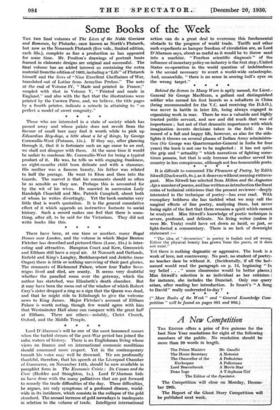It is difficult to commend The Pleasures of Poetry, by
Edith Sitwell (Duckworth, Os.), as it deserves withoutseeming extrava- gant. Miss Sitwell has selected from Milton and the Augustan Age a number of poems, and has written as introduction the finest series of technical criticisms that the present reviewer—deeply interested in the technique of poetry—has ever read. With exemplary boldness she has tackled what we may call the magical effects of fine poetry, analysing them, but never losing sight of the fact that there remains a spirit which cannot be analysed. Miss Sitwell's knowledge of poetic technique is severe, profound, and delicate. No living writer (unless it were Mr. Yeats) could have set down so lucid, so jUst, so light-footed a commentary. There is no lack of downright commentary.
statement :- " The idea of ' decoration' in poetry is foolish and all wrong. Either the physical beauty has grown from the poem, or it does not exist."
Yet there is nothing dogmatic or aggressive. The book is a work of love, not controversy. No poet, no student of poetry, no teacher dare be without it. (Incidentally, if all the last- named would read the paragraph on p. 13, beginning " In my belief . . " some classrooms would be better places.) Miss Sitwell's selection is as individual as her criticism : for instance, she includes the Dunciad„ Only one query arises, after reading her introduction. Is Smart's " A Song to David" really underrated to-day ?






































 Previous page
Previous page